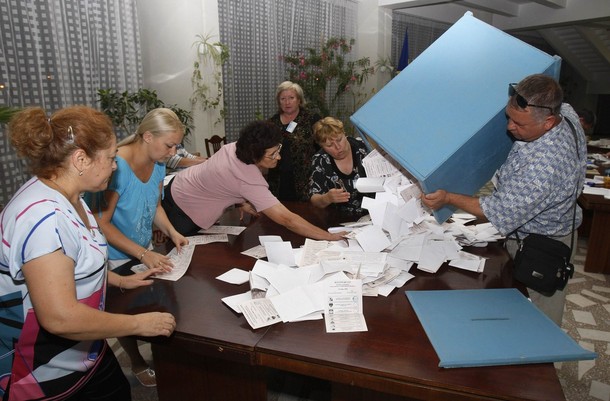
Moldova’s Elections: Limited Communist Victory Deepens Deadlock
Publication: Eurasia Daily Monitor Volume: 6 Issue: 147
By:

Moldova’s nominal Communist Party has won the parliamentary elections yet again on July 29, far ahead of the other parties. These elections were a repeat of the elections held on April 5, which the nominally Liberal opposition had refused to recognize as valid, in contrast to Western observers. Following the repeat elections the communists will only hold a plurality, not an absolute majority of seats in the new parliament, necessitating ad hoc alliances and a governing coalition.
The Communist Party garnered 45 percent of the total votes cast, translating (under the proportional system) into 47 or 48 seats in the 101-seat parliament. Four other parties will share the other 53 or 54 seats. The vitriolic campaign focused overwhelmingly on the responsibility for the April 7 destruction of the main state buildings in Chisinau and the ensuing police crackdown.
Alliances are a long shot in the current atmosphere of deep political fragmentation and degeneration of political debate into hate speech by most party leaders and their media, with the notable exception of the Democratic Party. Coalition arrangements will be required, however, for the new parliament to constitute itself and start operating, install a government, and elect a head of state. Meanwhile, Moldova’s institutional vacuum is deepening on all these counts.
The Communist Party’s score reflects both the static fact of its preeminence in Moldovan society, as well as the dynamic of its slow but irreversible erosion. Thanks to the "communist" brand’s attractiveness, the party has placed first in five consecutive parliamentary elections (1998, 2001, 2005, April 2009, and the July 2009 repeat elections), garnering nearly one half of the total votes cast and, thus, an absolute majority of parliamentary seats in the 2001-2005-2009 electoral cycles.
The nominally liberal opposition has gained next to nothing by forcing these repeat elections after the April 2009 regular quadrennial elections. The deadlock has, if anything, deepened; political fragmentation among the non- and anti-communist parties has grown more complicated; and the Communist Party has become more susceptible to tactical deal-making. In the April elections the communists had obtained 49.5 percent of the popular vote and 60 parliamentary seats. Following the repeat elections, however, it is the up-and-coming Democratic Party, not the liberal opposition that has emerged as main potential beneficiary of the Communist Party’s erosion.
Of the five parliamentary parties, all but the Democratic Party are linked in various ways with political projects of the past. The Communist Party appeals to Soviet nostalgia and mentalities and it operates to a large extent in Russia’s cultural and informational orbit. The Liberal Party is at its core a Romanian national irredentist party, oriented toward Bucharest and, in that sense, an heir to the inter-war period in "Bessarabia." The Liberal-Democrat Party (which also includes a Romanian national-nostalgic strand) is largely a project of business tycoons who rose during the 1990’s but did not manage at that time to introduce a political oligarchic model in Moldova. The third nominally liberal party, Our Moldova, is led by veteran officials from the final Soviet and initial post-Soviet years (ex-communists who dropped that brand), now on the threshold of retirement and hoping for a last go at government posts.
The newly launched Democratic Party with its 13 seats is well placed to hold the balance of power between the communists and the three nominal liberal parties in the new parliament. The party’s new leadership group is culturally distinct from the other parliamentary parties. It is for the most part a Westernized group, well traveled and fluent in English and French, and connected with Western political, diplomatic and professional circles. In its electoral appeal and discourse, this is the first Moldovan party fully emancipated from projects of the past and their still-vivid sequels in Moldova (Soviet/Russian, Romanian, shadow business structures). In this sense it can be said that the Democratic Party is unequivocally future-oriented. On the vexed issue of Moldovan versus Romanian national identity, Democratic Party leaders profess a Moldovan civic and ethnic identity free from the otherwise widespread inferiority complexes, and can also harmonize with Romanian cultural identity.
Marian Lupu, the chairperson of the outgoing parliament (2005-2009), took over a moribund Democratic Party in early and mid-June, with barely five or six weeks to go until election day. Resigning from the Communist Party, Lupu recreated and rebranded the Democratic Party as a possible balance-holder between the two large antagonistic camps and vehicle for Lupu’s own presidential ambitions. The party rose above the fray of mutual vilification and demonization that characterized this campaign. For a brand new entrant, the Democratic Party scored better than could have been expected, despite some clumsy tactical errors and hastily thrown together campaign staff.




